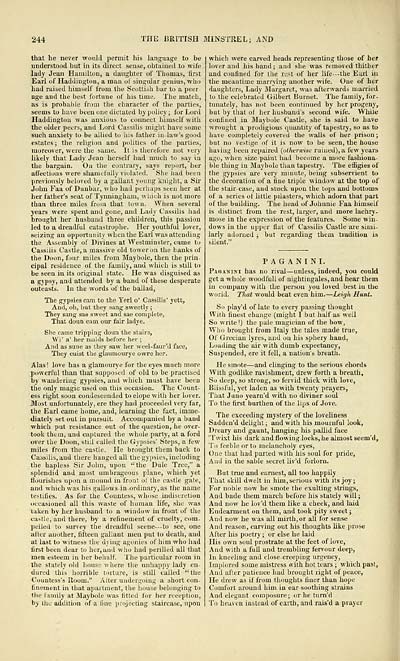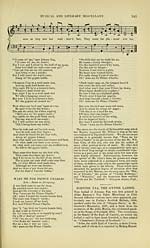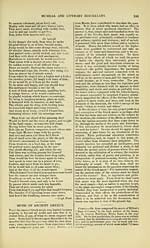Glen Collection of printed music > Printed music > British minstrel, and musical and literary miscellany
(252) Page 244
Download files
Complete book:
Individual page:
Thumbnail gallery: Grid view | List view

244
THE BRITISH MINSTREL: AND
that he never would permit his language to be
understood but in its direct sense, obtained to wife
lady Jean Hamilton, a daughter of Thomas, first
Earl of Haddington, a man ot singular genius, who
had raised himself from the Scottish bar to a peer
age and the best fortune of his time. The match,
as is probable from the character of the parties,
seems to have been one dictated by policy ; for Lord
Haddington was anxious to connect himself with
the older peers, and Lord Cassilis might have some
such anxiety to be allied to his father-in-law's good
estates ; the religion and politics of the parties,
moreover, were the same. It is therefore not very
likely that Lady Jean herself had much to say in
the bargain. Ou the contrary, says report, her
affections were shamefully violated. She had been
previously beloved by a gallant young knight, a Sir
John Faa of Dunbar, who had perhaps seen her at
her father's seat of Tynningham, wliich is not more
than three miles from that town. When several
years were spent and gone, and Lady Cassilis had
brought her husband three children, this passion
led to a dreadful catastrophe. Her youthful lover,
seizing an opportunity when the Earl was attending
the Assembly of Divines at Westminster, came to
Cassilis Castle, a massive old tower on the banks of
the Doon, four miles from Maybole, then the prin-
cipal residence of the family, and which is still to
be seen in its original state. He was disguised as
a gypsy, and attended by a band of these desperate
outcasts. In the words of the ballad,
The gypsies cam to the Yerl o' Cassilis' yett,
And, oh, but they sang sweetly ;
They sang sae sweet and sae complete.
That doun cam our fair ladye.
She came tripping doun the stairs,
Wi" a' her maids before her ;
And as sune as they saw her weel-faur'd face,
They cuist tlie glaumourye owre her.
Alas! love has a glamourye for the eyes mucU more
powerful than that supposed of old to be practised
by wandering gypsies, and which must have been
the only magic used on this occasion. The Count-
ess right soon condescended to elope with her lover.
Most unfortunately, ere they had proceeded very far,
the Earl came home, and, learning the fact, imme-
diately set out in pursuit. Accompanied by a band
which put resistance out of the question, he over-
took them, and captured the whole party, at a ford
over the Doon, still called the Gypsies' Steps, a few
miles from the castle. He brought them back to
Cassilis, and there hanged all the gypsies, including
the hapless Sir John, upon "the Dule Tree," a
splendid and most umbrageous plane, which yet
flourishes upon a mound in front of the castle gate,
and which was his galhiws-in-ordinary,as the name
testifies. As for the Countess, whose indiscretion
occasioned all this waste of human life, she was
taken by her husband to a window in front of the
castle, and there, by a refinement of cruelty, com-
pelled to survey the dreadful scene---to see, one
after another, fifteen gallant men put to death, and
at last to witness the djing agonies of him who had
first been dear to her, and who had perilled all that
men esteem in her behalf. The particular room in
the stately old house where the unhappy lady en-
dured this horrible torture, is still called "the
Countess's Ptoom." Alter undergoing a short con-
finement in that apartment, the house belonging to
tile family at Maybole was fitted for her reception,
by the addition of a tine ijrojecting staircase, upon
which were carved heads representing those of her
lover and his band; and she was removed thither
and confined for the rust of her life— the Earl in
the meantime marrying another wife. One of her
daughters, Lady Margaret, was afterwards married
to the celebrated Gilbert Burnet. The family, for-
tunately, has not been continued by her progeny,
but by that of her husband's second wife. While
confined in Maybole Castle, she is said to have
wrought a prodigious quantity of tapestry, so as to
have completely covered the walls of her prison ;
but no vestige of it is now to be seen, the house
having been repaired {otherwise ruined), a few years
ago, when sizepaint had become a more fashiona-
ble thing in Maybole than tapestry. The elBgies of
the gypsies are very minute, being subservient to
the decoration of a fine triple window at the top of
the stair, case, and stuck upon the tops and bottoms
of a series ot little pilasters, which adorn that part
of the building. The head of Johnnie Faa himself
is distinct from the rest, larger, and more lachry-
mose in the expression of the features. Some win-
dows in the upper flat of Cassilis Castle are simi-
larly adorned ; but regarding them tradition is
silent."
PAGANINI.
Paganini has no rival — unless, indeed, you could
get a whole woodfuU of nightingales, and hear them
in company with the person you loved best in the
world. That would beat even him. — Leigh Hunt.
So play'd of late to every passing thought
With finest change (might I but half as well
So write !) the pale magician of the bow,
Who brought from Italy the tales made true,
Of Grecian lyres, and on his sphery hand,
Loading the air with dumb expectancy.
Suspended, ere it fell, a nation's breath.
He smote — and clinging to the serious chords
With godlike ravishment, drew forth a breath.
So deep, so strong, so fervid thick with love.
Blissful, yet laden as with twenty prayers.
That Juno yearn'd with no diviner soul
To the first burthen of the lips of Jove.
The exceeding mystery of the loveliness
Sadden'd delight ; and with his mournful look.
Dreary and gaunt, hanging his pallid face
'Twixt his dark and flowing locks, he almost seem'd.
To feeble or to melancholy eyes.
One that had parted with his soul for pride.
And in the sable secret liv'd forlorn.
But true and earnest, all too happily
That skill dwelt in him, serious with its joy;
For noble now he smote the exulting strings.
And bade them march before his stately will ;
And now he lov'd them like a cheek, and laid
Endearment on them, and took pity sweet ;
And now he was all mirth, or all for sense
And reason, carving out his thoughts like jsrose
After his poetry ; or else he laid
His own soul prostrate at the feet of love.
And with a full and trembling fervour deep.
In kneeling and close-creeping urgency.
Implored some mistress with hot tears ; which past,
And after patience had brought right of peace,
He drew as if from thoughts finer than hope
Comfort around him in ear-soothing strains
And elegant composure; or he turn'd
To heaven instead of earth, and rais'd a prayer
THE BRITISH MINSTREL: AND
that he never would permit his language to be
understood but in its direct sense, obtained to wife
lady Jean Hamilton, a daughter of Thomas, first
Earl of Haddington, a man ot singular genius, who
had raised himself from the Scottish bar to a peer
age and the best fortune of his time. The match,
as is probable from the character of the parties,
seems to have been one dictated by policy ; for Lord
Haddington was anxious to connect himself with
the older peers, and Lord Cassilis might have some
such anxiety to be allied to his father-in-law's good
estates ; the religion and politics of the parties,
moreover, were the same. It is therefore not very
likely that Lady Jean herself had much to say in
the bargain. Ou the contrary, says report, her
affections were shamefully violated. She had been
previously beloved by a gallant young knight, a Sir
John Faa of Dunbar, who had perhaps seen her at
her father's seat of Tynningham, wliich is not more
than three miles from that town. When several
years were spent and gone, and Lady Cassilis had
brought her husband three children, this passion
led to a dreadful catastrophe. Her youthful lover,
seizing an opportunity when the Earl was attending
the Assembly of Divines at Westminster, came to
Cassilis Castle, a massive old tower on the banks of
the Doon, four miles from Maybole, then the prin-
cipal residence of the family, and which is still to
be seen in its original state. He was disguised as
a gypsy, and attended by a band of these desperate
outcasts. In the words of the ballad,
The gypsies cam to the Yerl o' Cassilis' yett,
And, oh, but they sang sweetly ;
They sang sae sweet and sae complete.
That doun cam our fair ladye.
She came tripping doun the stairs,
Wi" a' her maids before her ;
And as sune as they saw her weel-faur'd face,
They cuist tlie glaumourye owre her.
Alas! love has a glamourye for the eyes mucU more
powerful than that supposed of old to be practised
by wandering gypsies, and which must have been
the only magic used on this occasion. The Count-
ess right soon condescended to elope with her lover.
Most unfortunately, ere they had proceeded very far,
the Earl came home, and, learning the fact, imme-
diately set out in pursuit. Accompanied by a band
which put resistance out of the question, he over-
took them, and captured the whole party, at a ford
over the Doon, still called the Gypsies' Steps, a few
miles from the castle. He brought them back to
Cassilis, and there hanged all the gypsies, including
the hapless Sir John, upon "the Dule Tree," a
splendid and most umbrageous plane, which yet
flourishes upon a mound in front of the castle gate,
and which was his galhiws-in-ordinary,as the name
testifies. As for the Countess, whose indiscretion
occasioned all this waste of human life, she was
taken by her husband to a window in front of the
castle, and there, by a refinement of cruelty, com-
pelled to survey the dreadful scene---to see, one
after another, fifteen gallant men put to death, and
at last to witness the djing agonies of him who had
first been dear to her, and who had perilled all that
men esteem in her behalf. The particular room in
the stately old house where the unhappy lady en-
dured this horrible torture, is still called "the
Countess's Ptoom." Alter undergoing a short con-
finement in that apartment, the house belonging to
tile family at Maybole was fitted for her reception,
by the addition of a tine ijrojecting staircase, upon
which were carved heads representing those of her
lover and his band; and she was removed thither
and confined for the rust of her life— the Earl in
the meantime marrying another wife. One of her
daughters, Lady Margaret, was afterwards married
to the celebrated Gilbert Burnet. The family, for-
tunately, has not been continued by her progeny,
but by that of her husband's second wife. While
confined in Maybole Castle, she is said to have
wrought a prodigious quantity of tapestry, so as to
have completely covered the walls of her prison ;
but no vestige of it is now to be seen, the house
having been repaired {otherwise ruined), a few years
ago, when sizepaint had become a more fashiona-
ble thing in Maybole than tapestry. The elBgies of
the gypsies are very minute, being subservient to
the decoration of a fine triple window at the top of
the stair, case, and stuck upon the tops and bottoms
of a series ot little pilasters, which adorn that part
of the building. The head of Johnnie Faa himself
is distinct from the rest, larger, and more lachry-
mose in the expression of the features. Some win-
dows in the upper flat of Cassilis Castle are simi-
larly adorned ; but regarding them tradition is
silent."
PAGANINI.
Paganini has no rival — unless, indeed, you could
get a whole woodfuU of nightingales, and hear them
in company with the person you loved best in the
world. That would beat even him. — Leigh Hunt.
So play'd of late to every passing thought
With finest change (might I but half as well
So write !) the pale magician of the bow,
Who brought from Italy the tales made true,
Of Grecian lyres, and on his sphery hand,
Loading the air with dumb expectancy.
Suspended, ere it fell, a nation's breath.
He smote — and clinging to the serious chords
With godlike ravishment, drew forth a breath.
So deep, so strong, so fervid thick with love.
Blissful, yet laden as with twenty prayers.
That Juno yearn'd with no diviner soul
To the first burthen of the lips of Jove.
The exceeding mystery of the loveliness
Sadden'd delight ; and with his mournful look.
Dreary and gaunt, hanging his pallid face
'Twixt his dark and flowing locks, he almost seem'd.
To feeble or to melancholy eyes.
One that had parted with his soul for pride.
And in the sable secret liv'd forlorn.
But true and earnest, all too happily
That skill dwelt in him, serious with its joy;
For noble now he smote the exulting strings.
And bade them march before his stately will ;
And now he lov'd them like a cheek, and laid
Endearment on them, and took pity sweet ;
And now he was all mirth, or all for sense
And reason, carving out his thoughts like jsrose
After his poetry ; or else he laid
His own soul prostrate at the feet of love.
And with a full and trembling fervour deep.
In kneeling and close-creeping urgency.
Implored some mistress with hot tears ; which past,
And after patience had brought right of peace,
He drew as if from thoughts finer than hope
Comfort around him in ear-soothing strains
And elegant composure; or he turn'd
To heaven instead of earth, and rais'd a prayer
Set display mode to: Large image | Transcription
Images and transcriptions on this page, including medium image downloads, may be used under the Creative Commons Attribution 4.0 International Licence unless otherwise stated. ![]()
| Special collections of printed music > Glen Collection of printed music > Printed music > British minstrel, and musical and literary miscellany > (252) Page 244 |
|---|
| Permanent URL | https://digital.nls.uk/91437969 |
|---|
| Description | Scottish songs and music of the 18th and early 19th centuries, including music for the Highland bagpipe. These are selected items from the collection of John Glen (1833 to 1904). Also includes a few manuscripts, some treatises, and other books on the subject. |
|---|
| Description | The Glen Collection and the Inglis Collection represent mainly 18th and 19th century Scottish music, including Scottish songs. The collections of Berlioz and Verdi collected by bibliographer Cecil Hopkinson contain contemporary and later editions of the works of the two composers Berlioz and Verdi. |
|---|

